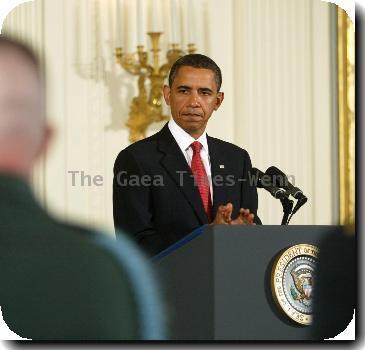Issue of which, how many lawyers pose conundrum for Blagojevich retrial
By APWednesday, August 25, 2010
Blagojevich may get scaled-down defense in retrial
CHICAGO — His own legal funds spent, former Illinois Gov. Rod Blagojevich may have to make do with a discount, taxpayer-financed version of his offbeat defense at any retrial.
At a Thursday hearing — the first since jurors deadlocked on 23 of 24 charges last week — a judge could say how many attorneys he keeps now that his defense will be publicly funded. It could be as few as two, down from the half dozen he had the first time around.
His theatrical lead attorney, Sam Adam Jr., has indicated to colleagues he may even want to step aside, though whether he’ll be allowed to is up to the judge.
On Thursday, Judge James Zagel also may try to pick a date on his already full calendar to squeeze in another trial. One could start within months or not for a year or more.
Zagel told attorneys in a private meeting last week he worried that if the trial started soon, it could spill into the Christmas holidays — posing a hardship for jurors — so he may want to hold it off until at least January, Blagojevich attorney Sheldon Sorosky said.
Defense attorneys also could use Thursday’s hearing to begin filing a torrent of motions, maneuvers that could delay initial steps toward a new trial for weeks.
The thornier issue, though, is the future makeup of Blagojevich’s defense team.
The Democrat drew on nearly $3 million in a leftover campaign fund to pay his lawyers during the first trial. But two-and-half months of proceedings sucked those coffers dry.
Blagojevich had half a dozen attorneys at his first trial, but Zagel could rule the broke ex-governor will now get only two.
“That’s what the system says in these situations, ‘That’s all you’re going to get,’” said former federal prosecutor Phil Turner. “‘Nobody else gets more than two, so why should you?’”
Turner said given the complexity of the case, which includes allegations Blagojevich schemed to sell or trade an appointment to President Barack Obama’s former Senate seat, Zagel may have to consider perceptions Blagojevich would be in an unfair fight with only two attorneys.
“The government has an army and, OK, this guy’s not a good guy,” he said. “But it provokes a sense of unease. The public loses confidence in the court system. This is a real conundrum.”
It’s not only an issue of Zagel forcing Blagojevich to cut lawyers. Adam and other attorneys may ask for permission to pull out, said Blagojevich attorney Sheldon Sorosky.
Adam’s office said Wednesday he was not available for comment.
The 38-year-old delivered a thunderous, sometimes quirky closing for Blagojevich — even reciting a joke about an old woman and a mule to help illustrate a point. Later, as jury deliberations began, he told reporters, “I love Rod Blagojevich.”
But after jurors announced their sole guilty verdict for lying to the FBI — prosecutors immediately vowing to try Blagojevich again on the 23 undecided counts — Adam seemed dejected. In a hallway afterward, the visibly exhausted attorney slumped against a wall, staring at the floor.
Sorosky insisted it wasn’t fatigue that has made Adam consider withdrawing.
“It’s just that I know that he honestly feels that Gov. Blagojevich needs a new lawyer or new approach for the second time around,” Sorosky said.
There’s a school of thought, he added, that defendants always should bring in new lawyers after a hung jury — partly because prosecutors know the tactics of the first set of lawyers.
Turner, for one, doesn’t buy that. He says employing the same lawyers has huge advantages, not least of which is that they know the details of the case inside and out.
Money also is a consideration.
Attorneys working on taxpayers’ dime get a little more than $100 an hour. That may seem generous, but it’s less than the more than $300 an hour a top defense attorney can make.
And the Blagojevich case is more all-consuming than most, said Turner, not just because of the amount of work but because of the stress and public scrutiny involved.
Even if defense lawyers ask Zagel to release them, he could refuse. He could argue new attorneys would take too long to prepare — pushing a trial date back more than a year.
But it’s unlikely Zagel would force a reluctant lawyer to stay on, Turner said.
“Just think of the issues you create,” he said. “If a defendant is convicted, he would say in appeal, ‘My lawyer was distracted at trial and he didn’t even want to be there.’”

